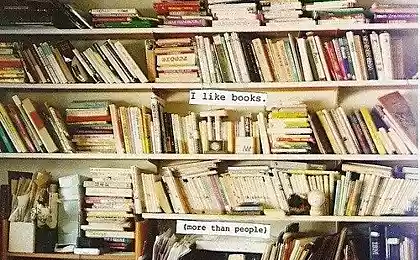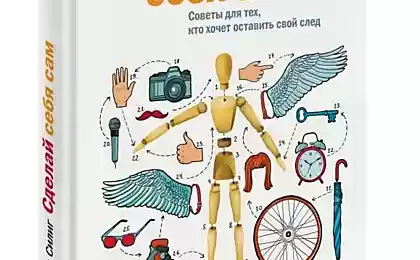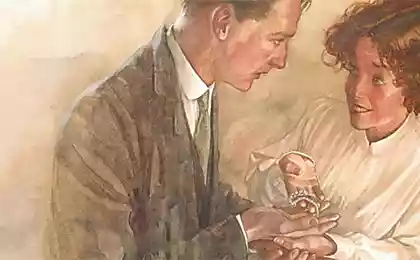671
9 books in the spirit of “help yourself”, which is not sick

Attention: before running and ordering a paper book, relying on my taste, I would recommend finding it in the electronic version and familiarizing yourself at least diagonally. The book is an intimate thing, other people’s advice works poorly.
I sincerely hope that they will be useful to you.
1. Dominic Loro, The Art of Living Simple
How to get rid of excess and enrich your life
The word "just" is my favorite. Perhaps the best review of Dominique Loro's book will be the epigraph of Kobayashi Issa: "This spring my hut is completely empty, completely full."
I have two feelings after reading it: on the one hand, much better than the well-known bestseller Essentialism. The Way to Simplicity by Greg McKeon, on the other hand – at times its categoricalness the book resembled instructions to young wives, coupled with advice on luxury style. Although something really useful for a reasonable organization of space and storage system, you will definitely learn for yourself – this is a fact. It is easy to read, pleasant, you can pull out the quotes in bundles.
I won't buy it in my personal library, but I left it in the reader.
Quotes:
Floating decorative style, or white space style, is a style where things exist because of the emptiness surrounding them. Every object becomes an object of art and every minute is precious.”
“I do not want to own or be responsible for things. I just want them when I need them.”
“Money should first be used as a lubricant for the gears of life.”
2.Brene Brown, “It’s because of me, but it’s not.”The truth about perfectionism, imperfection, and the power of vulnerability
I would like to recommend it to anyone who has questions. Who used to engage in self-digging, but only with a minus sign, looking for more and more new shortcomings. Who is often painfully ashamed of themselves – they say, all people are like people, and I am g... but. Anyone who does not understand the difference between “I did bad” and “I was bad” and instead of asking for help builds another wall of protection to sit behind her on antidepressants and suffer. Everyone who is tired of feeling guilty and wants to finally feel something different: lightness, confidence in themselves and their “normality”.
The book will be especially useful to anyone who grew up with a staunch eye for “what people will say” and barely remembers what it means to be yourself without fear of your own imperfection. Moreover, it is written with a good dose of humor (bow to the author and translator!), which helps to believe in a successful outcome and facilitates the assimilation of a rather complex material.
Quotes:
“Courage gives us a voice. Empathy gives us hearing. Without these two, empathy and communication are impossible.”
“If we make a mistake and say to ourselves, ‘I’m stupid, I can’t do anything right,’ we’re more likely to think the same about our child or husband when they make a mistake (even if we don’t say it out loud).”
“When we compete whose situation is worse, whose burden is heavier, whose pain is more painful, we lose sight of the fact that most of our suffering has the same root: impotence and disunity. When we are told “this is nothing,” we feel nothing. Most of us will grow our shame in silence because we won’t risk sharing something that may be “not as horrible” as someone else’s or “not terrible enough” to guarantee empathy.
3. Robert Holden, Starting a New LifeHow to Be Happy Right Now
I didn’t even want to approach this book because of the title: I thought there would be another labuda from a standard set of motivational clichés that you don’t know how to apply. So I was pleasantly surprised at how interesting and valuable she turned out to be – inspiring, optimistic, filled with faith in the best and that it is for you, not for some lucky person.
I sincerely recommend reading it! The translation is also excellent – well done!
Quotes:
“The first secret of spiritual healing is to begin with what is. Feelings can’t interfere with your life – they are your life!
“Consider that all your gifts do not come from you, but simply pass through you from the universe to the recipient. Give unselfishly, unconditionally, and then you will not be afraid to lose.”
“Fighting is always a choice. It is also a sign that you could make better choices. Through struggle, our own self defines itself; through drama, it creates its history; through suffering, it forms its philosophy of life; through pain, it tries to assert its value; through endless battles, it marks its territory; through the constant exaggeration of complexity, its own self secures its temporary existence. Naturally, when there is no need to fight, the ego seems to dissolve into space.”
4. Daniella Laporte, “Live with Feeling”How to set goals for which the soul lies
Absolute masterreading, because it develops an idea that is extremely rare in the literature on self-improvement and finding balance in life: the goals we set for ourselves should coincide with the feelings we want to experience. Because there are feelings behind the New Year’s Eve plan – that’s what we’re looking for, not specific numbers, people or things. Dealing with what lies behind your dreams is an unforgettable and dangerous journey within yourself. Because suddenly it may turn out that all external goals are connected by one red thread, some one feeling that is vital for you: you do not want money, but freedom; not your own house or apartment, but silence; not vivid impressions from traveling around the world, but the absence of unnecessary things on the way - no schedule, no junk, no relationships.
In general, this nicely crazy and cocky book (the author has a great sense of self-irony) is on my waiting list for a paper version, and this already says a lot. And yes – it was a problem to choose only three quotes, because in the process of reading I put a few dozen bookmarks!
Quotes:
“Every action we take is motivated by a desire to feel certain feelings. What to buy, what to eat, what to say, who to talk to, what to create, who to give love to, what to wear, what to listen to, what to bring home, what to finish and what to start, what to dream about – our choice is determined by the desire to feel good.
Our society, which is obsessed with productivity and performance, regards feelings as pathological.
“It was the coldest winter that I learned that I had an invincible summer inside me.”
5. Marty Laney, The Advantages of Introverts
The best I've read about introverts. No water and this American style of storytelling, which brings to white heat, when half of the book is told what the book will be about, and the next half - how it will help you, but in fact useful information - zero. Lanie - everything is clear, competent and on the case, like a real introvert. Reading her work, you begin to better understand yourself and your ways of communicating with the world, and most importantly - all the time catch yourself thinking: yes, for sure, this is about me! And suddenly you can see ways to help yourself communicate better and more productively, not to be irritated by the features of extroverts and appreciate their not the most selling at first glance properties of character.
Quotes:
“Introverts don’t talk just to say something. When they speak, they express their thoughts.”
Extroverts like to experience more, introverts like to know more about what they are experiencing.
Say no a few times and see what happens. Normal people won't leave you. If they leave, say no more often.
6. Sandy Newbigging, "Reflected."How to get rid of unnecessary thoughts and focus on the main thing
If you have repeatedly caught yourself on the fact that the ball of thoughts in your head plays non-stop, but this music does not please, but burdens, this Zen book is for you. Small but very practical, it contains many exercises to calm the anxious mind, which tends to live in the past, then in the future, but never in the present, while this very present passes safely.
One of the main promises of the book is to teach at any time at will to enter the state of flow, reaching the level of highest efficiency, and to get rid of the tyranny of the list of “things-to-do-before-what-can-be-rested”, because “you risk missing life, immersed in your thoughts.”
Quotes:
“Once you begin to explore the relationship with your emotions, you can free yourself from the emotional merry-go-round.” Whatever emotions arise, give them the freedom to come and go, and you will not experience stress or discomfort as they flow through you.
“If emotions don’t change, chances are you’re not watching them, you’re identifying with them.”
“The body follows the mind: if the mind is calm, the body also rests. To give the body peace means to give it the possibility of natural healing, balance: the body functions as intended, and ages slowly, preserving vitality.
7. Svetlana Bronnikova, “Intuitive nutrition”How to Stop Worrying About Food and Lose Weight
Probably one of the most interesting and fascinating books on the psychology of nutrition. Instead of citations, I will immediately dive into the problem with the words of the author:
Modern standards of beauty are ruthless: “beautiful” means “thin.” Trying to live up to these standards, millions of men and women chronically harass themselves with diets and tear themselves up in gyms. You cannot stop, you will gain weight. The price of this lifestyle is food “breakdowns” and “yo-yo effect”. Food instead of one of the pleasures of life becomes a source of constant and enormous tension.
Strongly coarse, we can say: the root of eating disorders in the violation of relations with oneself, in the inability to love and accept oneself. For many of us, food becomes a psychotherapist, a comforter, a universal problem-solver. Food becomes punishment and salvation.
To overcome this problem, there is no need for violence and eternal control over yourself: you just need to learn to trust yourself. Hatred of your “fat” body and “weak” will, coupled with dietary vices, is a dead end.
Tools for getting out of this impasse and offers Svetlana Bronnikova, in detail and in detail talking about the intuitive (non-dietary) approach to nutrition, based on the removal of prohibitions and fears in connection with food, the complete rejection of any diets not prescribed by doctors in connection with certain diseases, to give the body the opportunity to take its own initiative in choosing food.
8. James Hollis, "The Souls"Return to life after severe shocks
The work of James Hollis, Ph.D. and Jungian analyst, focuses on the dark times of the soul – the very swirls into which we occasionally sink, forgetting to breathe and denying everything in the world, starting with our right to feel this sadness, longing, sadness and imperfection.
The book is small, but capacious, written in a magnificent literary language with many figurative quotes and vivid comparisons. Truth be told, I’ve never bookmarked enough to come back later – if I had read it on paper with a pencil in my hand, I don’t know if it would have ended up with more indentations or my notes.
In general, if you are now stagnant, gloom, melancholy and slow immersion to the bottom of yourself, "Souls" will be a good therapy for playing Greek tragedy and will definitely help to raise the fallen nose a centimeter higher.
Quotes:
I believe that the greatest task in a relationship between two people is that each of them should guard the loneliness of the other.
“Our psyche uses depression to get our attention and to point out that there is a lie deep inside us. Understanding the therapeutic value of depression and going through it, like the thread of Ariadne, through the labyrinth of the psyche, in a sense, you can make friends with it. If we were not in pain, our psyche would be dead. Pain and suffering are a clear sign that there is something alive waiting to be called back to life.”
9. Elchin Safarli, Recipes for HappinessOriental cook's diary
A book that doesn’t have anything to do with self-improvement, but it’s “about what makes us happy,” and that’s its great resource power. Reading it, you seem to immerse yourself in a cozy world of aromas and colors, smells and textures, and together with the taste of new dishes, you rediscover the taste for life. A very harmonious and pleasant bestseller about food, life, culinary intricacies and oriental spices, written in the best traditions of Elchin Safarli’s love prose.
Quotes:
Cry until the tears have no meaning.
“Happiness does not come. The ability to see him comes.”
“Every loss, disappointment, separation can lead to happiness. I'm sure of that. It all depends on how we perceive the difficulties – as a final fall or as a push to take off. The most important thing is not to dwell on the difficulties and continue on the way. Let small and weak steps – nothing terrible, we will grow stronger on the road.”
Author: Olga Primachenko
How perfectly to decorate the living room in brown tones
Diabetes type II diabetes – the disease is man-made and preventable























